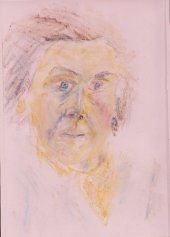
I met her in Paris where she worked as a maid. She was a peasant from around Burgos (northern Spain). Her mother died early and her father and stepmother treated her inhumanly. When she was five years old they sent her to a convent. There she wasn’t handled with silk gloves either; Spain was simply a hard country where the strongest survived. Five year old Carol scrubbed the convent’s floors and washed clothes from morning to night. She stood on a chair raised up on blocks of wood so she could reach the huge wooden washtub. The Mother Superior became aware of her smartness and said, “You should learn and you’ll rise above your condition and above others.” Thanks to the Mother Superior’s help and her own early awareness, Carol learned a lot in situations where others continued illiterate.
During the Civil War in Spain, Burgos was a military base for Germans and Italians who liked this little blondie and offered her candies. They were among the few besides the Mother Superior who showed her some warmth. She always kept good memories of them — plus fascism which she later lost. She didn’t grow up and probably because of a hormonal disturbance provoked by hardship and malnourishment, her proportions were ungainly — short body and long face, her skin pale and blotchy. In one word, she was ugly in spite of lively clear eyes and blond hair. She could get work only as a maid and the boys hissed at her. As a good Spaniard with an instinct for self defence she became stinging like a wasp and aggressive as a panther. Because the convent had been her only home and the Mother Superior her only mother, she never missed Sunday Mass but she wasn’t a devotee. Her life attitude was pragmatic in the Spanish way. I met her boyfriend, a Croat; they seemed a merry good couple. He probably would have married her but he was frank with her. She was too ugly to be presented to his family. They ended like dog and cat.
She left Paris to settle in Madrid. From this period began, for us, the most interesting chapter of her life. At the age of 50, Carol apparently finished her PhD in French literature at the University of Madrid. I knew that in Paris she had sometimes frequented the Sorbonne as a noncredit student but I never thought it was something serious. In this period she also lost her fascism; at the Spanish university there was a passionate debate about why Spain lost her glory so quickly after chasing away the Moors and the Jews.
I lost contact with Carol even though she was as loyal as a sister to me. Somehow I learned that she found somebody who knew how to appreciate her.
#88 excerpt, 4 Portraits, July-August 2005
